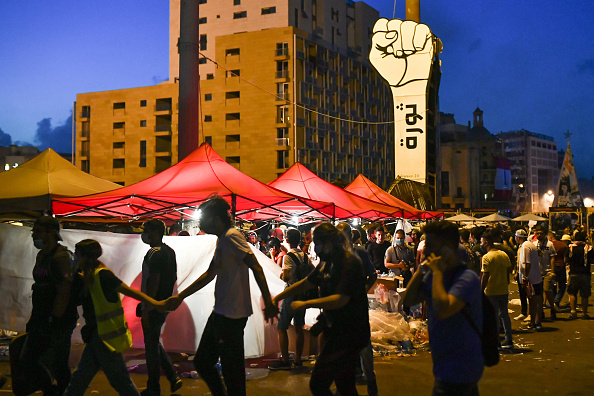Yet the mood in Beirut remains one of hopelessness as residents – many of whom are homeless and jobless - grieve for lost loved ones and struggle to rebuild the lives of hundreds of thousands of people. The path ahead for a country that was already descending ever deeper into the abyss is uncertain and strewn with peril and it remains to be seen whether this will serve as the long-awaited catalyst to dislodge an entrenched political class responsible for years of graft and mismanagement.
Even the outgoing prime minister himself pointed to the deep-rooted political elite for his own, and Lebanon’s, failures, describing corruption in the country as “bigger than the state” itself. “The success of this government means a real change in this long-ruling class whose corruption has asphyxiated the country,” Diab said Monday.
President Emmanuel Macron made it a point to say he was not here to support Lebanese leaders when he visited the country last week and would make sure that any assistance from France would go to the people. He reiterated that no financial assistance would be given to the government to help ease a deepening financial crisis without substantial reforms. “There is a need to create a new political order in Lebanon,” Macron said after meeting with political leaders, calling for a complete overhaul of the system and urgent reforms in all sectors.
He did not, however, address the massive challenge of doing this in a fragmented country that's almost bankrupt in addition to a lack political will among the political elite to change the way Lebanon is governed. After all, when donors committed $11bn to Lebanon in 2018, conditional on reforms, politicians went on with business as usual and the funding never materialised.

Fawaz Gerges, professor of Middle Eastern politics at the London School of Economics, told AP that the interests of Lebanon’s politicians were far too deeply entrenched in the system. “Even though historically speaking, such national catastrophes or ruptures serve as a catalyst for transformative change, I am deeply skeptical about the governing and ruling elite in Lebanon instituting change on their own. This is delusional,” he said.
Lebanon’s decision-making process is beholden to its system of consensus government, which divides leadership among the country’s many religious sects. This system, Nadim Houry is the executive director of the Arab Reform Initiative team and the former head of Lebanon's Human Rights Watch office told NPR, has become entrenched in corruption. “In Lebanon, the corruption has now become part of the DNA of the political system of the country, the so-called, sectarian consociational system. You cannot appoint a single official, whatever the rank is, without going through the clientelistic sectarian networks of what we call the zuama, the sectarian leaders. Now, why is this corrupt? Because that means you cannot hold a single official responsible without going through these traditional sectarian clientelistic networks,” he said.
Many analysts believe Lebanon cannot change until the old power-sharing system of governance that’s deteriorated into cronyism, incompetence and graft will have to be replaced — or at least dramatically modified. But that is easier said than done. It will likely take years of instability, unrest and dismal economic conditions to get there.
“The main demand today is to have a salvation government of people that are outside of the existing political class. This would be a government that has a clear mandate to steer the ship through the economic crisis, that would have the trust of the people. It would be an exceptional situation for two or three years just to stabilize the ship and adopt a fair electoral law and have elections in two or three years, which, hopefully, will see the emergence of new political parties,” Houry said. “I realize what we're talking about is really a fight as to who is going to stay in Lebanon. It's they or us at this stage,” he added.
There also remains the enduring challenge of “how to prevent clientelist groups from infiltrating this movement to benefit from that money coming to Beirut,” Paul Salem, president of the Middle East Institute, said during the Carnegie Center’s web panel. “The revolution has been successful in bringing down governments. But we haven’t been successful in raising up alternative leaders that can really take the place of corrupt oligarchies,” Salem said. This, he explained, will require moving away from a sectarian model to an overarching national one.
Introducing new laws to reform the voting and governing systems of the country would take time and would require buy-in from some of the current political actors. However, there is no shortcut to the need for structural reform and an overhaul of a political system that has passed its use by date, wrote the editor in chief of The National Mina Al-Orabi.
“UN relief and international aid is not a viable long-term solution. “While acceptable for immediate aid distribution, it cannot be the mechanism for recovery and reconstruction. The state should be responsible for the rebuilding of Beirut. Undercutting the state by handing over responsibilities to the UN – or France – is not a solution.”
“The nation state is a concept we should protect. The fact that aid, the investigation into the explosion, the clean-up of the city are all bypassing normal channels represents the failure of this government, and deals a series of blows to Lebanon's state institutions. There are more than enough competent and able Lebanese who can lead their country – if given the chance,” she added.









